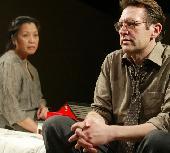SEARCH CurtainUp
REVIEWS
FEATURES
NEWS
Etcetera and
Short Term Listings
LISTINGS
Broadway
Off-Broadway
BOOKS and CDs
OTHER PLACES
Berkshires
London
LA/San Diego
Philadelphia
Elsewhere
QUOTES
On TKTS
LETTERS TO EDITOR
FILM
LINKS
MISCELLANEOUS
Free Updates
Masthead
NYC Weather
The Architecture of Loss
|
I no longer believe in redemption. I believe in suffering without reason or reward ---Catherine who has had an abundance of suffering, including the loss of a husband and son. |

Mia Katigbak, Victor Slezak
(Photo:Joan Marcus ) |
As one of the characters who's a tour guide at a local museum explains it, there's an unpredictability to the desert, so that a sudden rain can transform its barren surface into a burst of wildflowers from one season to the next. But Ms. Cho is a tough writer. She lets her characters unpack all their pain: Catherine (Mia Katigbak) and Greg (Victor Slezak), the husband who deserted her; their daughter Carmie (Angel Desai, the tour guide); and even the senile father Richard (Will Marchetti). By the time she allows us to hear the clap of thunder (hope?), we've seen and heard too much to buy into the possibility of "rain " bringing the closure that would give these dry and arid lives a chance to unfold again.
The plot revolves around a series of flashbacks prompted by Greg, now a gainfully employed, reformed alcoholic, who suddenly shows up at the home from which he disappeared fourteen years earlier. He learns that his son, like him, disappeared without a trace eight years earlier, why his now senile father-in-law (Marchetti) is living with the long-suffering Catherine (Katigbak) and why his twenty-five-year-old daughter (Desai) quit college. The flashbacks also include his own traumatic encounter with Jay, a young runaway (Jason Lew) whose life echoes what might have happened to the missing child.
This young playwright (she's only twenty-eight) displays a distinct flair for spare dialogue and weaving her story into scenes that shift comfortably from present to past and back. However, the architecture of her play is cluttered with so many losses that the tension of its more than two dozen scenes borders on melodrama. You're left wishing Ms. Cho had taken less of a little bit of everything that could go wrong in one family approach (alcoholism, sexual and physical abuse, desertion, unrequited love affair, ethnic identity, mother-daughter/father-daughter conflicts). Had she focused on Catherine's conflict about growing up as the child of a war-time inter-racial marriage, some of the scenes that make the ninety-five minutes at times seen much longer might have organically eliminated themselves.
While the play is too even-handed in recounting each of these memories of loss and regret, the script short-changes itself on lighter moments. There are occasional snippets of wry humor -- as when Catherine shrugs off Gregg's compliment about her coffee making with "It's Folger's" and when Carmie's flippant high school friend Rob (Eric Wippo) teases her about seeing a man he knows is "old" because he has "the Friar Tuck thing happening." When these humorous touches do occur, they make their absence overall that much more acute.
Under Chay Yew's direction the cast is impressively low-key. Ricardo Hernandez has created an approiately arid set -- covered with sand, and furnished with just a table and a couple of chairs, and lighted by Mary Louise Geiger to reflect changes in mood and locale.
Even though this play, like the people it depicts, is flawed, at a modest $20 price tag its worth seeing this lovingly produced, well-acted production by an emerging young playwright.
| The Architecture of Loss
Written by Julia Cho Directed by Chay Yew Cast: Angel Desai, Mia Katigbak, Jason Lew, Will Marchetti, Matthew Saldivar, Victor Slezak, Eric Wippo Set Design: Riccardo Hernandez Costume Design: Linda Cho Lighting Design: M.L. Geiger Sound Design: Jill B.C. DuBoff Running time: 95 Minutes without intermission NYTW's 4th Street Theatre, 83 East 4th Street (Second Avenue/ Bowery) 212-460-5475 From 12/19/03 to 1/25/04; opens 1/11/04. Tue - Sat at 7:30pm; Sat & Sun at 1:30pm. Tickets, $20. Reviewed by Elyse Sommer based on January 8th performance |

Mendes at the Donmar
Our Review

At This Theater

Leonard Maltin's 2003 Movie and Video Guide

Ridiculous!The Theatrical Life & Times of Charles Ludlam

Somewhere For Me, a Biography of Richard Rodgers

The New York Times Book of Broadway: On the Aisle for the Unforgettable Plays of the Last Century

6, 500 Comparative Phrases including 800 Shakespearean Metaphors by CurtainUp's editor.
Click image to buy.
Go here for details and larger image.



